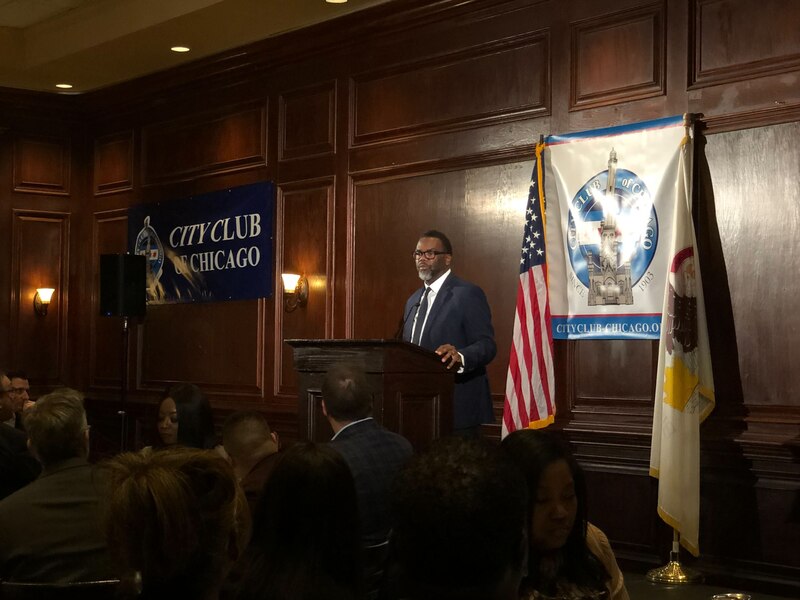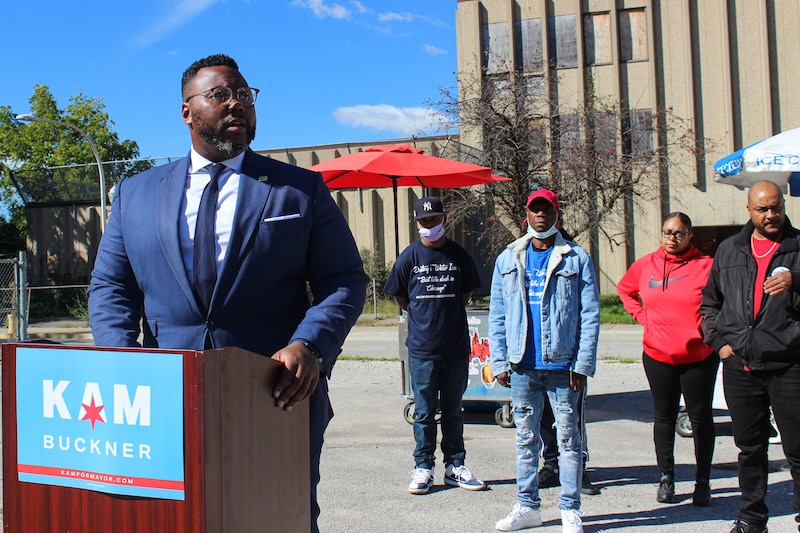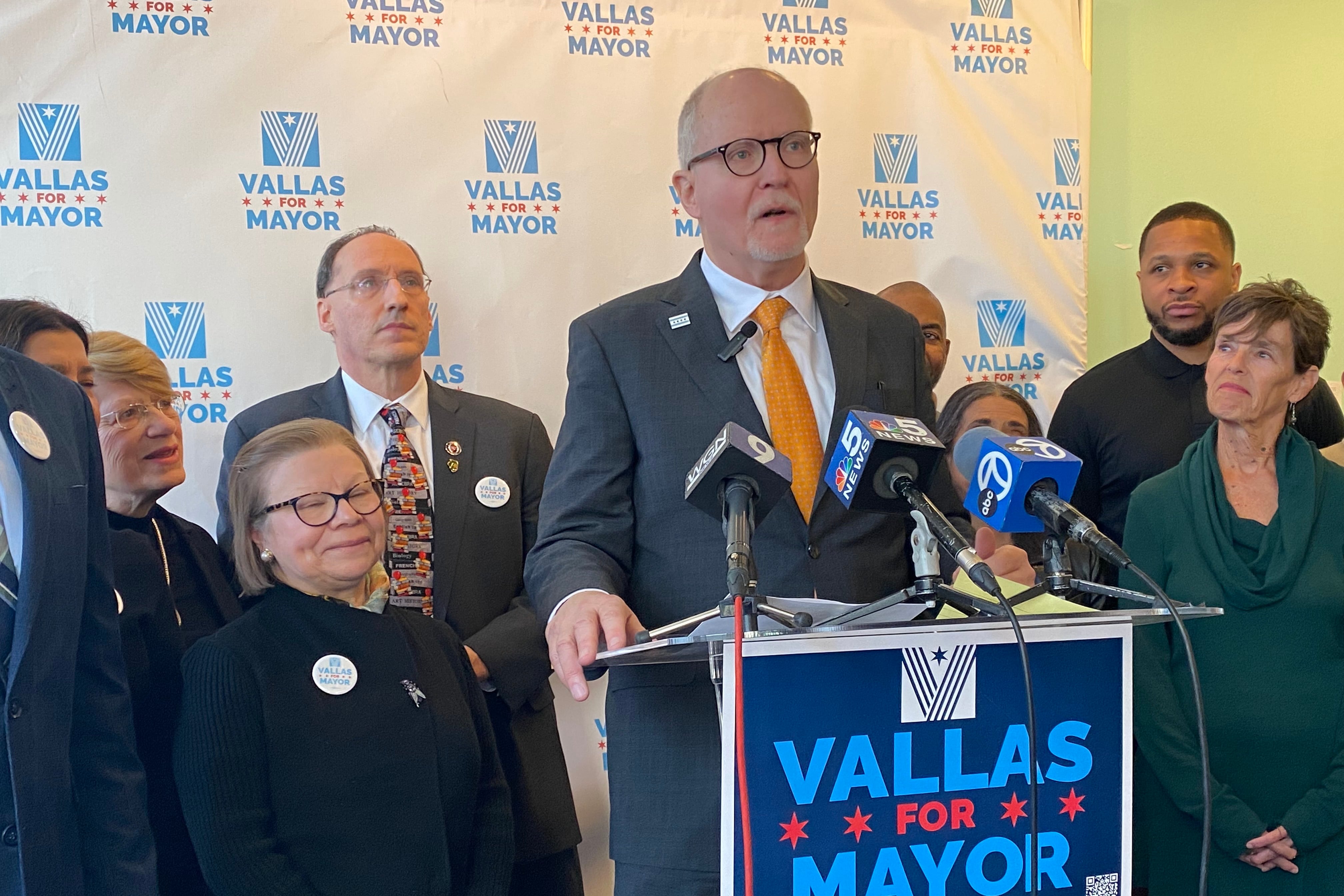Chalkbeat is a nonprofit news organization covering public education in communities across America. Subscribe to our free Chicago newsletter to keep up with the city’s public school system and state education policy.
What grade would Paul Vallas get for his tenure leading Chicago Public Schools? Depends who you ask.
Supporters describe the first CEO of Chicago Public Schools — and a current mayoral hopeful — as a reformer with a gift for turning around struggling school districts. But critics raise concerns about financial mismanagement, lackluster academic growth, and harsh punishments for low-performing schools.
Vallas has built his mayoral campaign around reducing crime and improving public safety. He’s also touted his record as a fixer who led public school systems in Chicago, Philadelphia, and New Orleans.
His message resonated with voters. Vallas led a crowded field of nine candidates in the Feb. 28 election, garnering 34% of the vote, according to unofficial preliminary results posted by the Chicago Board of Elections Tuesday night. Cook County Commissioner and teachers union organizer Brandon Johnson secured the second spot with just over 20% of the vote, denying incumbent Lori Lightfoot a second term.
Vallas and Johnson will face off in a runoff election on April 4.
Before Vallas became CEO, Chicago Public Schools had been labeled the “worst in the nation’’ by then-U.S. Education Secretary William Bennett. Now, the city’s schools find themselves in another tumultuous time, coming off three years marked by pandemic disruptions, labor strife, and a drop in test scores.
The years ahead will be critical for the district, which faces declining enrollment, challenges disentangling its finances from the city as it transitions into an elected school board, an increase in student mental health issues, and achievement gaps that widened since the beginning of the COVID pandemic.
Vallas unveiled an education platform in early February that includes keeping schools open nights and weekends, putting alternative schools in empty or underenrolled schools, expanding voucher programs, and creating more charter schools — recycling some policies that have fallen out of favor in recent years.
On his campaign website, Vallas touts his life’s work as restoring “broken education systems” in Chicago, Philadelphia, post-Katrina New Orleans, and Bridgeport, Connecticut.
But other candidates have taken aim at Vallas’ education record, arguing he helped create Chicago schools’ current financial problems and laid the groundwork that ultimately led to the closing of Black and Latino schools under other district CEOs.
He’s faced similar criticisms in Philadelphia and New Orleans. Vallas was hired in Philadelphia after the state took over the public school system and made dramatic changes, but left the district with a deficit. In New Orleans, Vallas closed neighborhood schools and opened charter schools. He faced criticism over “lack of transparency, inattention to the most disadvantaged students,” according to the Times-Picayune. But former U.S. Secretary of Education Arne Duncan, his successor as CEO at Chicago Public Schools, lauded his efforts in New Orleans as a model for reform.
Vallas’ campaign did not respond to questions and multiple interview requests. But he has defended his record, calling criticisms “not grounded in facts” and “a sign of desperation.”
When unveiling his education platform, Vallas said test scores improved during his tenure as Chicago’s schools CEO, his administration opened 78 new schools, and secured two collective bargaining agreements with 21% pay raises for teachers. His work was praised by President Bill Clinton, Vallas added.
The most controversial part of Vallas’ record may be his decision to forgo pension payments and the most debated may be whether reforms led to enough academic growth.
Teacher pension payments paused when Vallas ran CPS
In recent weeks, opponents have criticized Vallas, arguing his decisions contributed to the city’s financial problems. Johnson, who will now face Vallas in the runoff, said he would be a “disaster” for the city.

“It was his budgetary practices that led us into the economic despair that we have now,” Johnson said. “And now he wants to be trusted with the same budget that he couldn’t get right when he was here? That’s a real threat.”
After serving as the city’s director of budget and finance, Vallas was chosen in 1995 by then-Mayor Richard M. Daley to serve as the school district’s inaugural CEO.
Vallas was tasked with balancing the budget and improving test scores in the school district that less than a decade earlier had been named among the worst by the U.S. Department of Education.
Under Vallas, Chicago Public Schools stopped making regular payments into the teachers’ pension. With the district facing an anticipated $1.4 billion deficit, Vallas trimmed the budget by cutting central office staff and eliminated “wasteful spending” from special education and other departments, according to Chicago Magazine.
The same state law that gave Daley control of the schools also changed the tax levy that directly funded the pension system, allowing Daley and Vallas to use money once earmarked for pensions to help cover operating costs, said Chuck Burbridge, the former executive director of the Chicago Teachers Pension Fund from 2015-2020.
The legislation only required district leaders to make pension contributions if the fund fell below 90% of being fully funded, Burbridge said.
The district did begin making payments again in the early 2000s, Burbridge said, but a “pension holiday” approved amid the great recession further contributed to the Fund’s current condition.
Chicago Public Schools’ teachers’ pensions are currently under 50% funded, according to a report presented to the Board of Education last fall.
Gery Chico, who served as school board president during Vallas’ tenure, defended the decision to direct pension funds toward the operating budget. The pension fund has to be assessed annually and at the time the fund was 90 or 100% funded, Chico said.
“There was no reason to overfund the pension when you had tremendous needs in the classroom,” Chico said.
Under Vallas, Chicago’s student test scores saw marginal improvements
During Vallas’ tenure as Chicago schools chief, he implemented a series of reforms including the end of “social promotion,” summer and after-school programs for failing students, and so-called “academic probation” for low-performing schools.
Vallas faced criticism then and now for these policies being too punitive and paving the way for dramatic — and often destabilizing — changes to school communities in the name of performance. For instance, schools on probation were “reconstituted” or turned around, resulting in dozens of principals and 200 teachers being fired. After Vallas left, the probation policy he put in place was used to close low-performing schools over the course of the following decade..
Despite the drastic steps taken districtwide, test scores showed marginal improvement, according to a Northwestern study commissioned by the Chicago Board of Education. Researchers suggested improvements in high school test scores were largely due to improvements in elementary instruction. At the high school level, instruction was shallow and some high school teachers were only reaching as little as five students in their classes, according to the same study.
At the time, Vallas argued that the district as a whole had higher overall test scores and blamed teachers who resisted reform for the shortcomings, according to the Tribune.
“Test scores are always tricky,” said former Chicago Teachers Union President Deborah Lynch-Walsh, noting the high percentage of CPS students living in poverty. Lynch-Walsh, who is now supporting Vallas’ bid for mayor, said the additional after-school programs and expansion of magnet schools Vallas implemented were notable efforts at improving student achievement.
Nonetheless, Vallas resigned in 2001.
“I would like to think the school system is better off today than it was in 1995,” he said at the time, according to the Chicago Tribune. Earlier that year, Daley had expressed concern over stagnating reading scores, but applauded Vallas’ work and called him “quite simply the best” schools CEO.
Today, critics and opponents, including Johnson and State Rep. Kam Buckner, argue that mayoral control of schools under Vallas would bring back harmful policies to Chicago Public Schools.
In a debate earlier this month, Buckner derided Vallas’ title as a “turnaround specialist” calling his policies harmful. He said Vallas’ formula is one of replacing neighborhood schools in New Orleans with charter schools, not paying into the pension fund, then leaving for the next opportunity.

“Paul Vallas did in New Orleans what Mayor Emanuel did in Chicago: closed huge numbers of neighborhood schools in one fell swoop,” Buckner said. “It was a mistake in Chicago, it was a mistake in New Orleans, and if Vallas gets the keys to the city back, rest assured he’ll keep the closures coming until neighborhood schools like my school, Morgan Park High School, are a thing of the past.”
Before Vallas resigned as CEO, Lynch-Walsh had also been a critic of his, saying he had “left teachers out of the reform process and acted as if students’ performance would improve if only the schools got rid of bad teachers,” according to the Los Angeles Times.
Lynch-Walsh, who was elected CTU president just before Vallas resigned, wrote a letter to him at the time advocating for smaller schools and criticizing the reconstitution policy, according to Catalyst Chicago.
Now, two decades later, Lynch-Walsh says his current plan offers an “amalgam of lessons learned” from his time leading public school systems in Chicago, New Orleans, Philadelphia, and Connecticut.
Lynch-Walsh, who worked with Vallas during his brief stint as chief administrator officer at Chicago State University, believes he has the experience to meet the current challenges the school district faces in the coming years.
“He’s got a plan for those challenges and problems,” Lynch-Walsh said.
And there will certainly be challenges ahead for the next mayor when it comes to Chicago Public Schools. No matter who wins.
Mauricio Peña is a reporter for Chalkbeat Chicago, covering K-12 schools. Contact Mauricio at mpena@chalkbeat.org.





